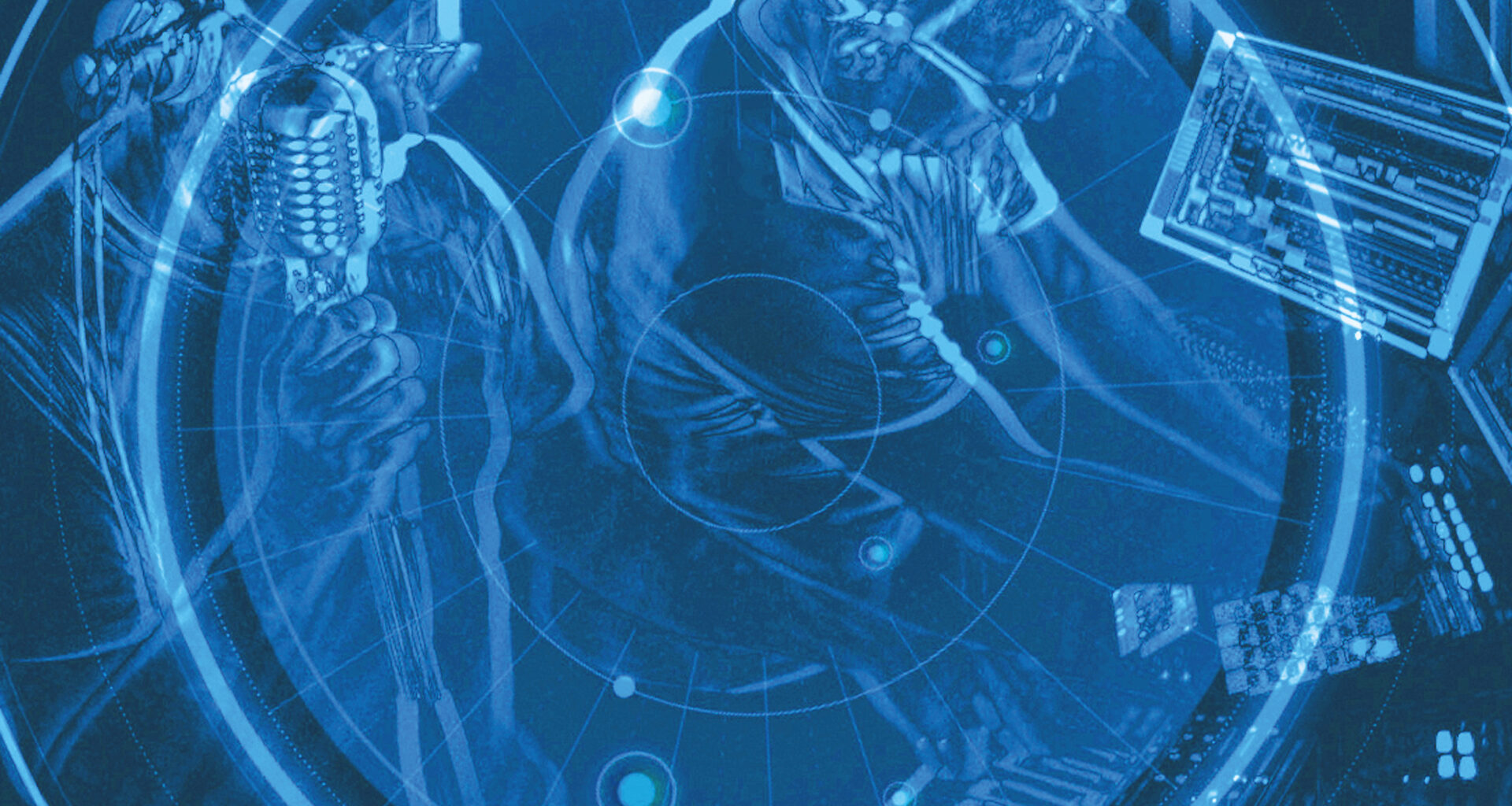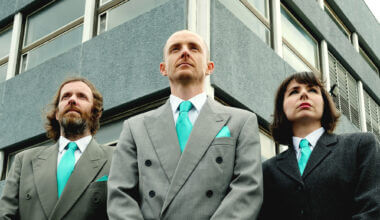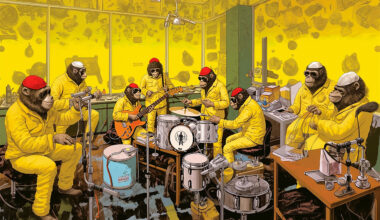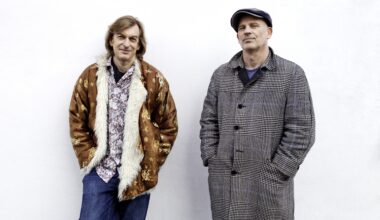By anyone’s standards, 22 years is a while. As their new album ‘Suilven’ appears over the horizon, John Vick and Davie Miller explain why it’s taken the best part of two decades to morph from Finitribe to Finiflex
“She said she was up for it anyway…”
John Vick, one half of Finiflex, is talking about the moment when the duo very nearly found themselves with a rather well-known new addition to their ranks. His fellow musical partner, Davie Miller had arrived for a late night session at the Finiflex studios in Leith, Edinburgh, where John was finishing up a voice-over session with the First Minister of Scotland, Nicola Sturgeon.
For whatever reason, it sadly wasn’t to be. Anyway, co-ordinating their schedules would have been a nightmare in itself, we would suggest. Even getting John and Davie in the same room at the same time has been quite a stretch. Their new album ‘Suilven’ was created in snatched moments either at the crack of dawn or late at night. A labour of love perhaps, but an extremely accomplished one at that. One that spans a plethora of electronic styles, old and new, from ‘Ta Ta Oo Ha’, the playful, Kraftwerk-esque single that preceded it, to heavier, more acid house clobber.
Of course, there are also many echoes of the project which John and Davie were first involved in; the legendary, but still underrated outfit Finitribe. For the uninitiated, Finitribe (also sometimes referred to as Fini Tribe) played a pivotal role in the changing post-punk landscape in the mid-80s that led to the acid house revolution at the end of the decade.
They were formed in Edinburgh in 1984, and as well as John and Davie, the original six-piece line up included Chris Connelly, who would later become the mastermind behind inventive and iconic industrial bands, Revolting Cocks and Ministry.
From their roots as a post-punk guitar outfit, Finitribe started up the Finiflex label in 1984, releasing the ‘Curling And Stretching’ EP before radically reinventing themselves and ditching the conventional drums/bass/guitar set up in favour of electronic hardware and samplers.
After dropping the first showcase for their new sound, the ‘Let The Tribe Grow’ EP, they embarked on a career that would see them straddle the divide between industrial and rave. ‘De Testimony’ from the EP became an anthem for the original Balearic/acid house generation, leading to a deal with revolutionary Chicago house label Wax Trax! They toured extensively, got involved in a legal spat with a leading burger chain over their ‘Animal Farm’ EP (see Issue 37) and cemented their anti-consumerist stance with 1989’s ‘Grossing 10K’ album.
Embracing remix culture, they worked with Graham Massey from 808 State, Justin Robertson and many others, possibly most notably handing Andrew Weatherall their ‘101’ single in 1991, which soon became one of his most celebrated reworkings of all time.
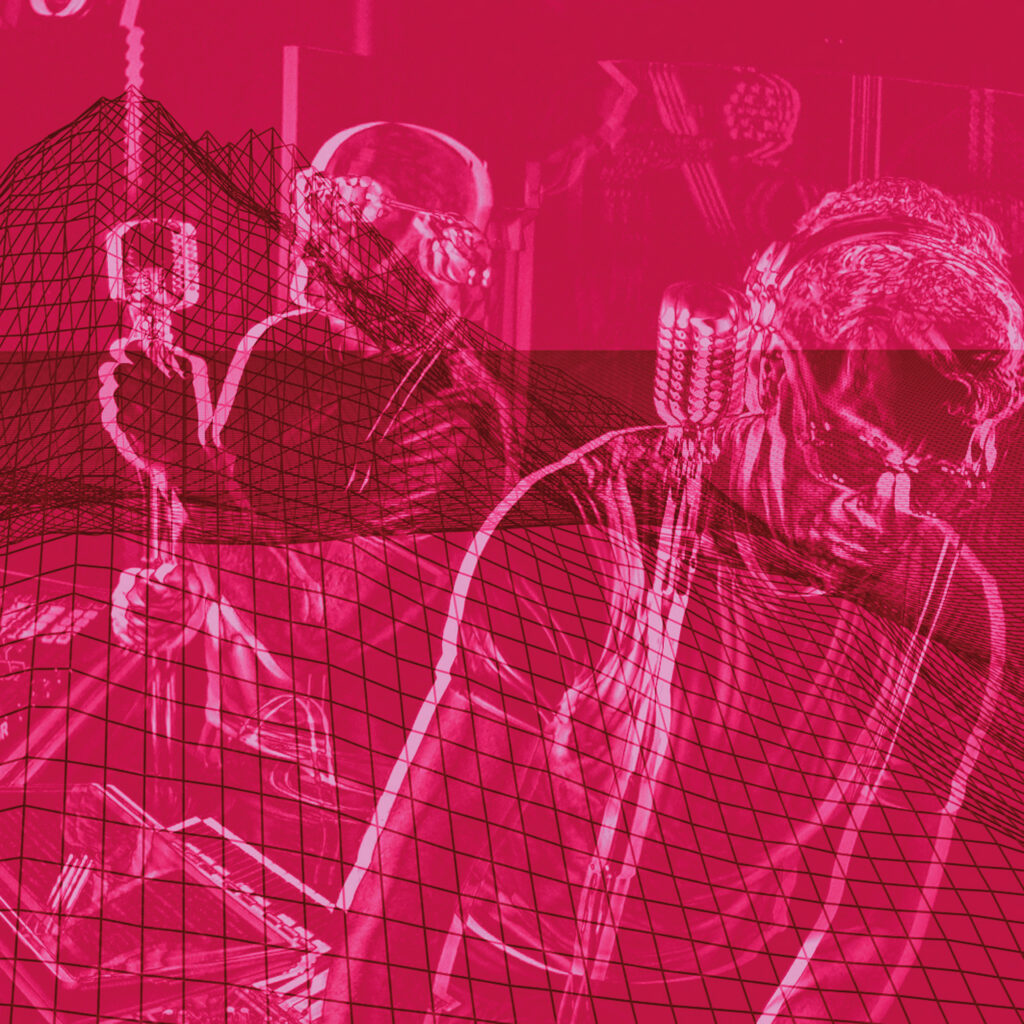
Leaving their long-time home at One Little Indian in 1992 after the album, ‘An Unexpected Groovy Treat’, they hooked up with Pete Tong’s FFRR imprint, using their advance to develop the Finiflex studio into state of the art facilities. So when John eventually left the band in 1996, it was to concentrate on the Finiflex complex. Which is where we rejoin the story some 22 years later.
John has indeed turned Finiflex into one of the city’s leading studios. In terms of music production, the roll call of dancefloor royalty who’ve used their services includes DJ Rolando, Andrew Weatherall, Sparks, Billy McKenzie and Soft Cell’s Dave Ball. But that’s only part of the story – they also specialise in high-end sound recordings for television, radio, sound design and advertising.
“The Leith Agency, who are one of the top advertising agencies in Edinburgh, are based nearby,” says John, “and there are a lot of other agencies and companies here in the city too. They’ve ended up realising that I’m here if they need something doing.”
He laughs when he recalls some of the jobs he’s been called on to perform, with a job for Irn Bru coming top of the list.
“We had to create the sound of a police horse singing, ‘You’re not singing any more’ at disgruntled fans walking past,” he remembers.
Other high-profile Scottish clients include the Royal Bank Of Scotland, Irvine Welsh and the Scottish National Party, which is when Nicola Sturgeon nearly joined the Finiflex line up.
“We were producing a party political broadcast for the SNP and afterwards, Davie arrived while Nicola was listening to some of the music we’ve done. We were talking about her fronting the band and she was well up for that!”
Sturgeon should count herself very lucky for getting a sneak preview of the developing Finiflex material, because as John relates, it’s been a pretty underground business.
“It’s been very underground,” he says, “hardly anyone has really known about what we’ve been up to. It’s been a case of doing a session at 6am and then Davie heading off and me putting my suit on to get to work in the studio. A lot of hard graft has gone into it.”
The studio’s surroundings in Leith have certainly played their part in keeping them grounded.
“Is it like ‘Trainspotting’?” John ponders our somewhat stereotypical question. “Not really… but we have got a massive tower block opposite us, and people jump off it from time to time, and doors get kicked in by the police on a fairly regular basis. It’s actually cordoned off at the moment. But the people who live here are fantastic. We’ve been here so long now and the people are really friendly.”
Given that the last time the duo had released an album they’d both worked on was 23 years ago, they must have noticed a few changes to the musical climate.
“The internet has happened,“ says John, before admitting that he’d just spent much of the day reviewing the 2,000 subscriptions to the Finiflex email service. Finiflex is still very much a cottage industry, he explains, pointing out that the ability to keep in touch so directly with their fanbase has been revolutionary for operating in a DIY manner.
“The other main difference,” says Davie, “is not having a producer and no record label.”
In other words, for possibly the first time since the very earliest days of their career, they’ve been free to make the music they want to make without interference. Davie recalls a past meeting with a well-known indie label who would offer him a deal if he could make a track identical to one the band had previously released.
“I had to tell them I’d really struggle to make something exactly the same as something I’d already done,” he confesses, “in the end I just had to say no and walk away.”
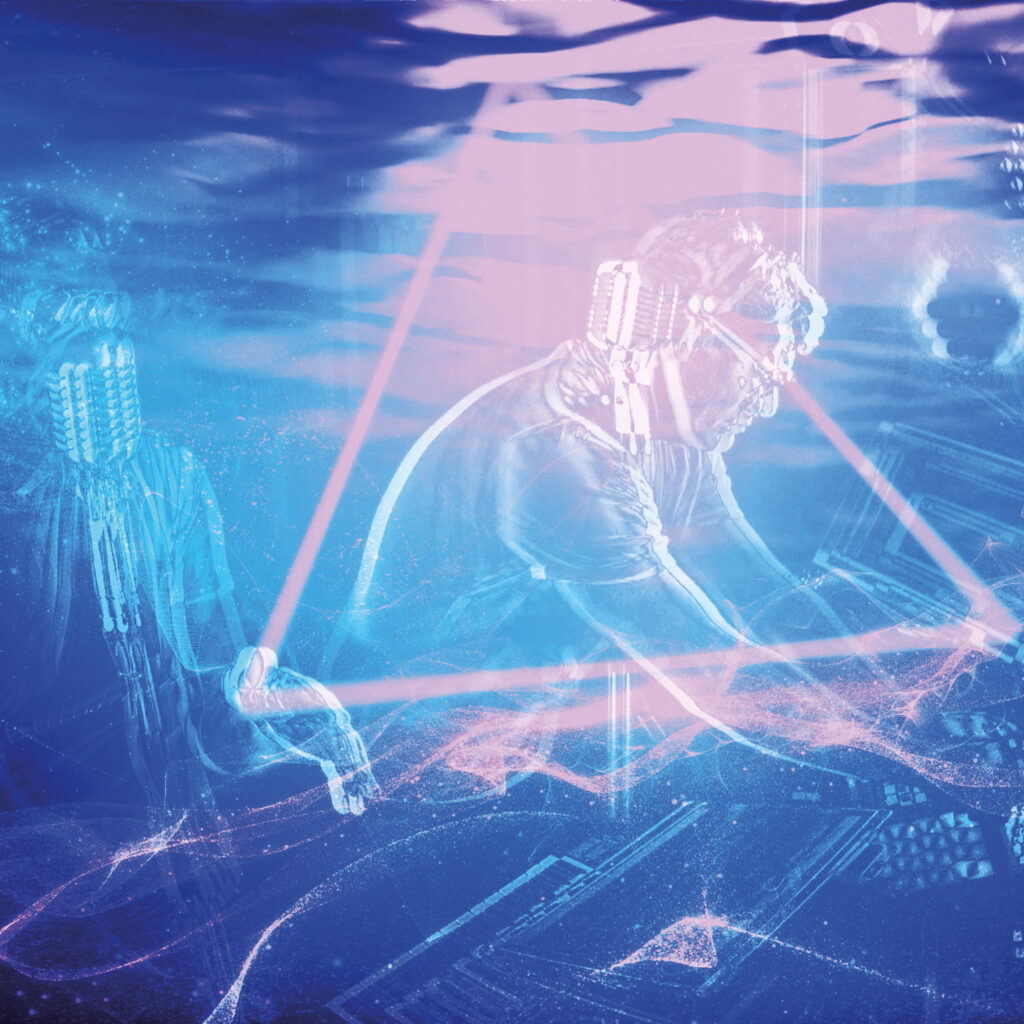
The vast improvements in the quality of software and plug-ins has made a self-produced album a much less lo-fi undertaking too, but even more significant is the fact that, in musical terms, there’s another seismic shift which has been reflected in the offering across the double album ‘Suilven’. Unlike during the late-80s and 90s, when electronic music was moving fast, evolving into very specific and very different genres and sub-genres, the present landscape is relatively fad-free.
The trademark Finitribe sound of pumping bassline energy and strident vocals now needs no remixing to be completely current and accepted as part of the electronic music canon, as evidenced by the arrival of the second single from the LP, ‘Bonus Freaks’, and its subsequent gatecrashing of the UK’s vinyl Top 40.
Where once the divide in industrial and techno music seemed marked, now it’s all but irrelevant. As a result, ‘Suilven’ sounds like music that’s been freed up and let loose without the need to fit into the restrictive stylistic boundaries of fashion. From ‘The Piano Player’, which has overtones of gnarly dubstep (but also a synthpop song structure that harks back to Depeche Mode), to the electronic purity of ‘TX20’, with its Orbital-esque acid spirals and Kraftwerk-like vocoder voices, it spans the whole spectrum of moods, tempos and musical disciplines.
So how did the musical reunion between John and Davie happen? The reissue of a handful of classic Finitribe releases, including both ‘De Testimony’ and Weatherall’s celebrated rejig of ‘101’ emerged in 2014 and, off the back of being back in the nation’s consciousness, a request for the band to play live came pretty much out of the blue. They were asked whether they’d be up for supporting a spoken word performance by Richard Jobson, of Scottish punk veterans The Skids, at the centrepiece of the Edinburgh Fringe, The Pleasance.
“It was ironic,” says Davie, “because we’d first played there in 1989.”
Davie remembers that although they were keen to do the show, there was no way they were going to dust off a few DATs and run through a greatest hits catalogue. New material was going to have to be constructed.
“Right from the start, we’ve been very determined that this wasn’t going to be a retro thing,” asserts Davie.
Since that show at the end of 2016, they’ve been road-testing material from ‘Suilven’ at live dates in Edinburgh, Glasgow, Dundee, the Nonstop Easter Weekender in Skye and Kosmopolis in Barcelona. The Orb were keen to offer them a support slot and there have been more weird coincidences and “returning to full circle” moments too, with gigs supporting 808 State (whose key member Graham Massey was another to mix the classic ‘101’) and even a date with genius eccentric synth duo, Sparks, who the old Finitribe had both toured with and released records by, via their label.
They’re keeping a relatively open mind about the process of being recording artists once again, happy to do DJ-based album playbacks as well as full-on live events, depending on what budget arises and which opportunity is thrown their way.
“We’re going to put the album out and see if anyone invites us to come and play,” says Davie, in typically modest tones. The final piece of the puzzle to be slotted in is the visual aspect, both for live performances and to accompany the album tracks themselves.
“We’re creating a video for every track on the album,” says John. “Someone we know has created lots of ‘ammunition’ for us using CGI, perfect for tracks like ‘TX20’, which is all about a robot coming to life.”
In another coincidence, and once again thanks to the advances in cottage industry video technology, the man drafted in to create the final pieces is none other than Andy McGregor, who was a member of the original six-piece Finitribe line up of the mid-80s.
What should be one of the most stunning parts of this project is a wireframe electronic representation of the mountain that gave the album its title, Suilven. Situated in a remote part of Sutherland, way up in the northernmost part of Scotland’s highlands, Suilven is a uniquely shaped mountain, almost lunar in appearance.
“It’s very beautiful,” Davie concludes, “you really should look it up if you haven’t seen it.”
Those most acquainted with the duo’s previous work will have already, no doubt, spotted the link. The last Finitribe album that Davie and John were both involved in was written and pre-produced in 1994 in a small crofting settlement called Sheigra near Kinlochbervie, and the album ended up with the title ‘Sheigra’.
True to their roots for sure, and perhaps sharing more than a little of the majesty and mystery of the Scottish rugged highlands, their choice of title for the new album makes a lot of sense. A mountainous name for another mountainous achievement, we probably don’t even need to add.
‘Suilven’ is out on Finiflex
